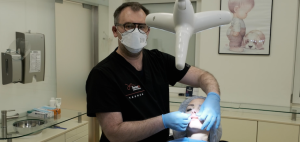
Discussion of Electronic Medical Records continues
Continued discussion on Electronic Medical Records
President of the NRL prof. Andrzej Matyja sent a letter to MPs – members of the parliamentary health committee, who will discuss the state of digitization of health care in Poland on June 23 during a meeting. Local government hopes to postpone mandatory EDM exchange and medical event reporting, set to go into effect as early as July 1.
July 1 this year. two obligations imposed by art enter into force. 56 Law on the health care information system: reporting of medical events and exchange of EDM documents. As prof. Andrew Matyka, these duties cannot be performed if information systems are not implemented in medical facilities. The ministry conducted in the spring of this year. A survey of medical facilities on their state of preparedness, but the results have not yet been published.
– The Health Ministry is spreading the argument that “some facilities have managed and are ready,” thus suggesting that other facilities could have too, only delayed, hoping for more postponements. Well, this is not true. A large number of facilities with implemented digital solutions are entities large enough that it was rational for them to order proprietary solutions, independent of the offerings of cabinet software companies. Most facilities, however, are entities that will use typical universal programs – argues the president of the NRL.
According to a survey conducted by the NRL, a large number of providers are currently finishing adapting their applications to the new requirements. What’s more, the basic official document describing the requirements for providers’ systems is being revised at the moment, and the revised version has not yet been published. Under these conditions, one can speak of the lack of a proper vacatio legis.
The most important data security
The most important issue, however, is the security of patient data. The premise of exchanging medical records is to deposit them in special repositories, i.e. disk spaces available 24/7 in the system, from where, after authorization by the patient, the entity taking over the treatment will be able to retrieve them.
– The problem will be the well-known fact that cybercriminals are always, as a rule, one step ahead of data security staffs. It is unreasonable for each provider to organize repositories separately. The Ministry of Health dismisses the subject with silence, covers it with a repetition of the statutory provision and an argument about the few “who have succeeded” – adds prof. Matyja.
Medical facilities are required to keep medical records for 20 years. – Who will cover the costs of operating the distributed repositories, which are likely to increase over the years, if only because the number of documents will grow exponentially over 20 years? Who is able today to determine the level of cost of maintaining repositories in the future? This is a new service, basically unknown until now. Will the health minister decide to be a guarantor of the constancy of these costs? Has the National Health Fund secured, as part of the valuation of services, adequate sums for maintaining the security of databases subject to exchange? – asks the president of the NRL.
The local government postulates that it should be assumed that medical facilities did not have sufficient opportunity to prepare for the July 1 deadline this year. and hopes that the health ministry will allow all willing providers to use repositories built on regional platforms.
A new obligation for providers to report „medical events” related to the operation of the Medical Information System comes into effect in July. – This is further proof that there is no escape from electronic medical records today, says dental legal counsel mec in an interview with Dentonet. Arkadiusz Jóźwik.


